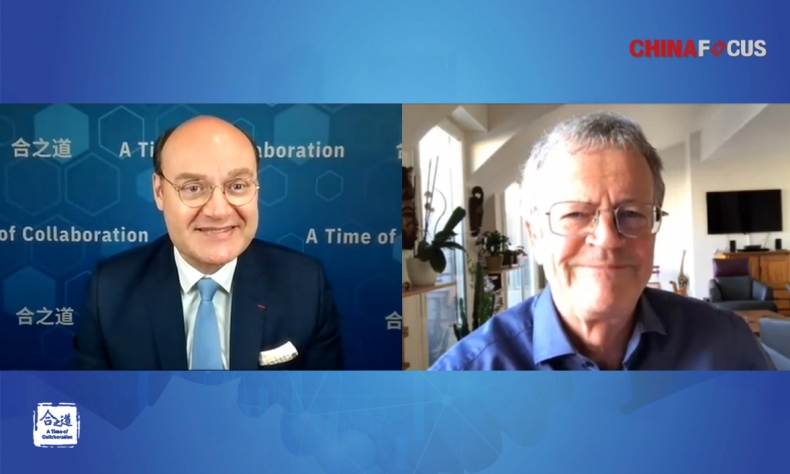
Multilateralism Against Climate Degradation
In fact, I don’t like the word climate change, it’s climate degradation. A change could be positive. This one is not positive at all.
Editor’s Note: Global warming has been an urgent threat to the world. All countries should work together to cope with the challenge. What can China and European Union do to enhance their cooperation on climate change? David Gosset, the founder of Europe-China Forum, discussed with Dr. Pascal Boniface who is the founding Director of the French Institute for International and Strategic Affairs – IRIS, based in Paris. He is also a professor of international relations at the Institute for European Studies at the University of Paris-8.
A Time of Collaboration, hosted by Mr. Gosset, is a high-level dialogue with international veteran diplomats, business elites and outstanding scholars. The serial interviews are presented by China Focus in association with DG2CI Limited.
David Gosset: Thank you very much. It’s really great to have you with us. You are a specialist of international relations. And I would like to ask you a very simple question, but I think a very important question. How do we foster the collaborative spirit?
Pascal Boniface: Being realistic, in fact, it’s not a matter of moral, but a matter of realpolitik. We have the right to be selfish. We have not the right to be not clever. And to go to multilateralism, it’s just to be clever. Because we are in a global world, the challenges we must cope with are global and not national. If we are not cooperating, we will not be able to overcome the huge challenges of the 21st century. So, I think that multilateralism, it’s not an option. It’s of utmost necessity. If we don’t go in this direction, everybody will lose something.
David Gosset: Thank you very much. Talking about global challenges, one of them is climate change. Five years ago, we had a very important agreement in Paris, the Paris Agreement. And I would like to ask you, what is your assessment of today’s situation vis-a-vis the issue of climate change?
Pascal Boniface: There is good news and bad news. The good news of course is the end of Trump mandate and the fact that Joe Biden has declared that his first priority will be to come back to the Paris Agreement and to struggle against climate change. In fact, I don’t like the word climate change, it’s climate degradation. A change could be positive. This one is not positive at all. But on the other hand, we will see that Mr. Bolsonaro in Brazil, Mr. Scott Morrison in Australia are still climate skeptics. They don’t go in this direction.
On the side of the good news, you have the reaction of civil societies, public opinion and among all of the young generation, which is very dedicated, because it affects their future, and they are really dedicated to struggling against climate degradation. I think that we must also be clear that some countries which want to, we have members of Paris Agreement, don’t respect every note of this Agreement and to have coal in this mix of energy, energy mix is not a good thing. We must give up coal in the near future.
David Gosset: Thank you very much, professor. You are a prominent expert of international relations. You have been observing with great attention the development of the relationship between the EU and China. Where do you think, professor, we should deepen the relations between China and the European Union?
Pascal Boniface: There are many fields of cooperation. The first one, and probably the most important one, because it’s the most important change the world has to face, is to fight together against degradation of climate. China is an important member of the Paris Agreement. They have changed their policy. They were climate skeptics in the past. Now they are reactive to protect the climate. I will say that on this field, we are on the same side, China and the European Union. We have some differences on trade, and we must solve these differences.
Regarding Africa, we could also work together. The development of Africa is a common goal for China and Europe. Sometimes, let me be frank, sometimes we are rivals, but most of the time, we could work together for the best interest of everybody, China, Europe, and Africa. And if Africa could have more infrastructure, could have more important infrastructure, it will be good for everybody.
Regarding the World Health Organization and the fight against disease, because new pandemic could come again, and so we must work together to reinforce the World Health Organization and to find a common vaccine, and to make the future of vaccine against COVID-19, a common good, a world’s common good.
David Gosset: Thank you very much, professor, for you very constructive remarks and to remind all of us, also, even when we talk about China and the EU, of the importance of Africa, to a certain extent, the continent of the future. Thank you very much, professor.
Pascal Boniface: Thank you.
 Facebook
Facebook
 Twitter
Twitter
 Linkedin
Linkedin
 Google +
Google +










